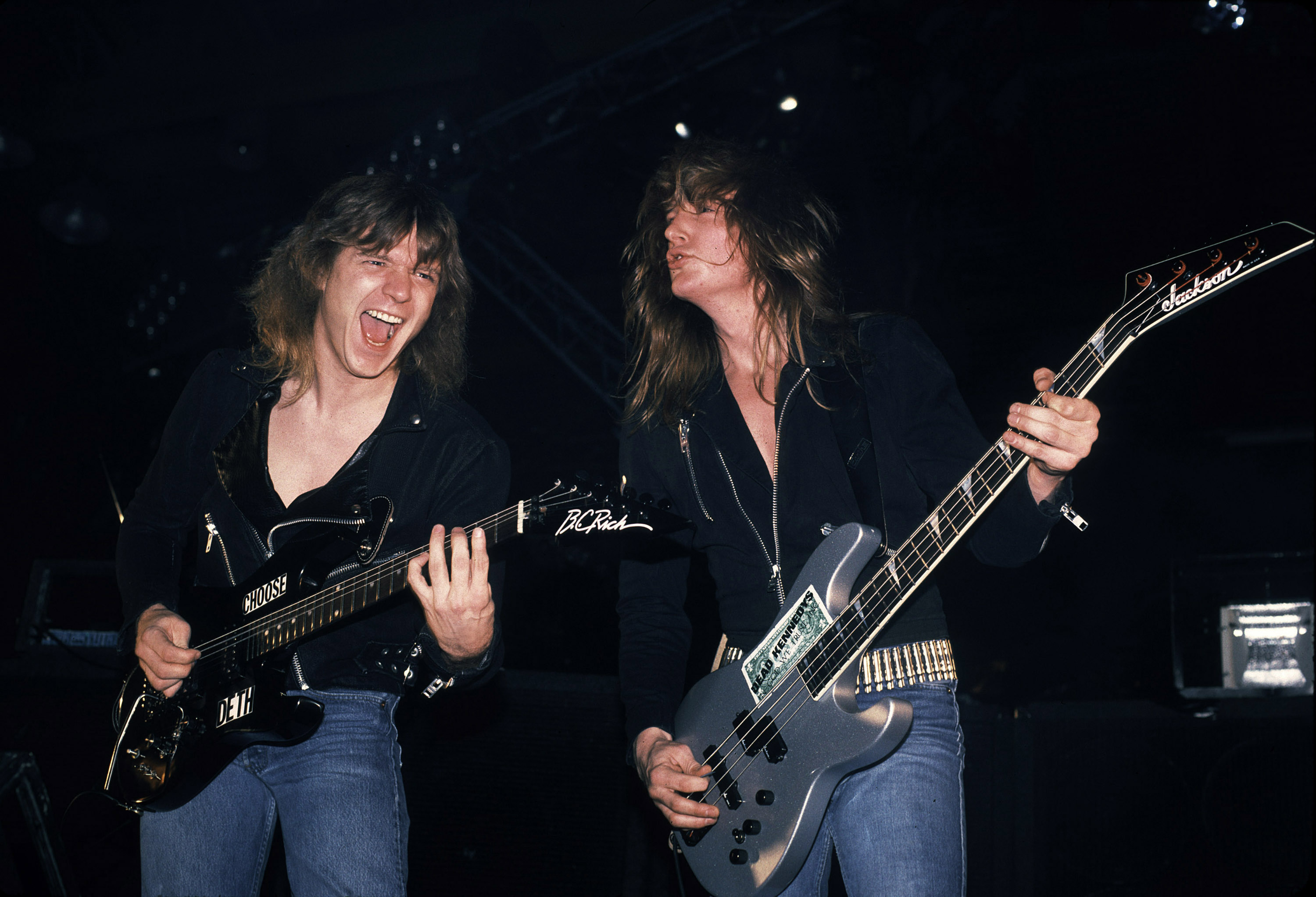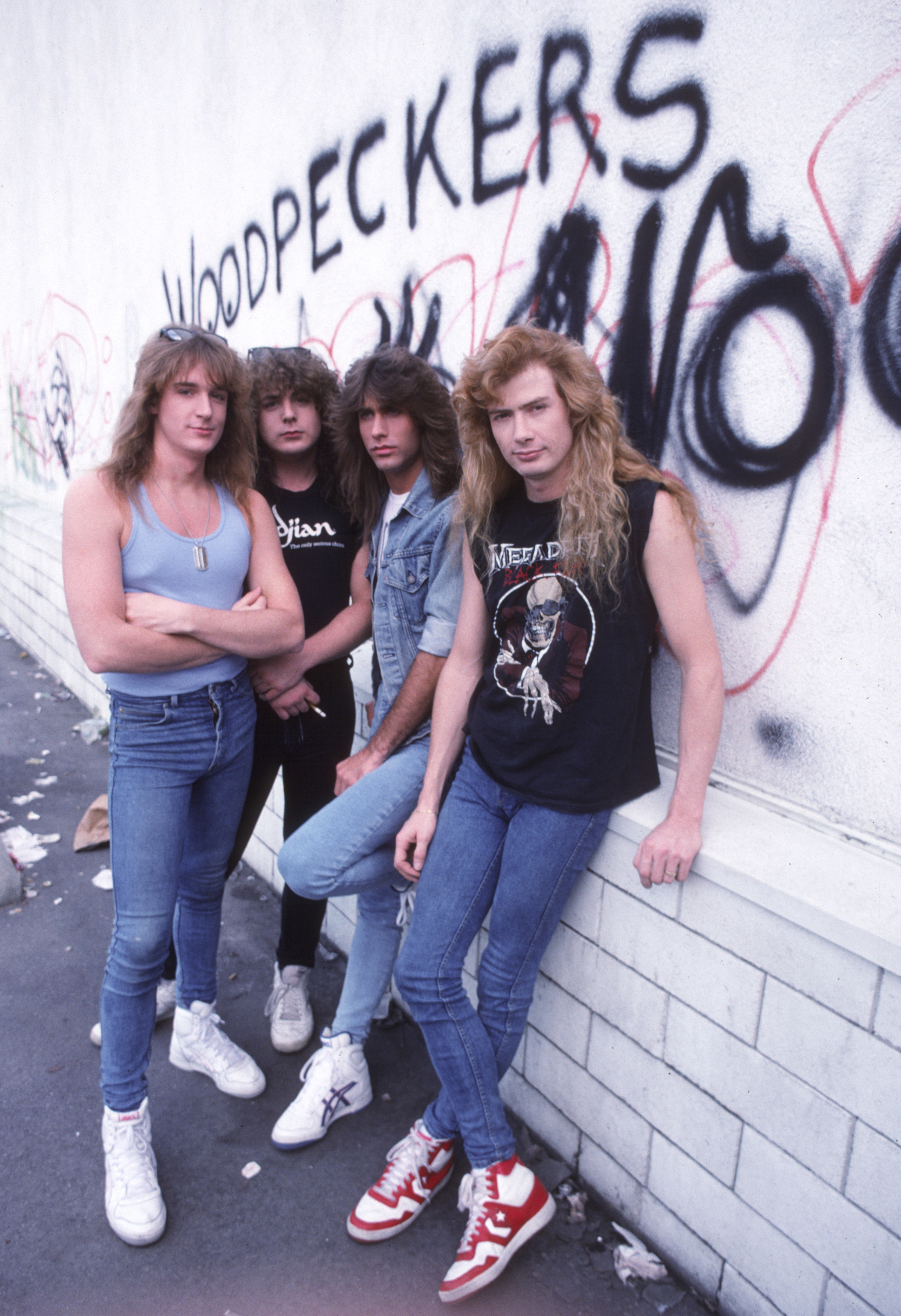Dave Mustaine - At War With The World
The former Metallica guitarist and no-holds-barred Megadeth mainman talks about his drug hell, his contempt for some of his ex-bandmates and his musical legacy

Dave Mustaine’s still fiery-red hair is dripping wet as he arrives direct from the hotel’s gym. It’s the start of a European press jaunt: the first time proper that he’ll be speaking to the media about Megadeth’s break-up a couple of years ago, and their return with the just-released album The System Has Failed [2004]. At the head of the queue, Classic Rock is the first to cross swords with a guitarist/vocalist famous for being... less than accommodating when it comes to talking to journalists.
This time, however, the tables have turned. Journalism, like everything in this consumer-driven society of ours, is more confrontational than ever before. No one is interested in a bland ‘puff’ piece – a plug for an artist’s latest product – any more; readers want the dirt. And why not? Dave Mustaine hasn’t exactly spent these past two decades picking daisies, neither has he withheld his opinions in the past.
As a drug dealer in the 1980s, Mustaine discovered the New Wave Of British Heavy Metal movement via a punter who chose to pay for his score with albums instead of cash. Mustaine was ejected from the fledgling Metallica in 1983, prior to the band recording their debut album Kill ’Em All and was replaced by Exodus’s Kirk Hammett. The dismissal changed Mustaine’s life forever. Presented with a Greyhound bus ticket in New York, he spent the long trip home to California plotting the concept of a new band he wanted to form: Megadeth.
“I went from playing music for fun to playing music for payback,” he admitted years later. “I didn’t really care who was in [Megadeth], I just had something I wanted to accomplish. I wasn’t going to be looked upon as someone who wasn’t good enough.”
Despite Mustaine’s drug and alcohol abuse and his issues of self-worth, Megadeth created some of thrash metal’s most bold and incisive music, including the albums Peace Sells… But Who’s Buying? ([986], So Far, So Good… So What! [’88)] and Rust In Peace [’90]. By 1992’s Countdown To Extinction, which smashed into the US chart at No. Two, he had a million- unit-selling band on his hands.
Alice Cooper became his real-life godfather and passed on advice about sobriety, although still Mustaine wobbled; he has now been in and out of rehab for a reported 17 times.

Despite watering down the group’s original formula on Youthanasia [’94], Cryptic Writings [’97] and Risk [’99], those albums were successful beyond Mustaine’s dreams. Money and respect came with the multi-platinum sales, but there was still a major problem for Mustaine: Metallica were bigger than Megadeth.
Sign up below to get the latest from Classic Rock, plus exclusive special offers, direct to your inbox!
In early 2002, following disappointing sales of The World Needs A Hero, Megadeth crashed to a halt. Claiming to have suffered a debilitating nerve injury to his arm – caused when he literally slept on it the wrong way – Mustaine told the world he could no longer play guitar.
Fast forward two years to a new Megadeth, this time minus previous bassist David Ellefson. Apart from the help of guitarist Chris Poland, who played on the first two albums, Mustaine otherwise pieced together The System Has Failed with session musicians. There’s even talk of a tour, without Poland.
Perhaps surprisingly, Mustaine also appeared in Metallica’s recent fly-on-the-wall movie Some Kind Of Monster, reluctantly allowing cameras to shoot a highly charged meeting between him and drummer Lars Ulrich, together with Metallica’s ‘performance coach’, Phil Towle. The confrontation took place on Mustaine’s 40th birthday, and was intended to heal old wounds. In fact it had the exact opposite effect. Mustaine insists he was “duped” into being filmed, and later tried to have his segments excluded from the $4.3 million movie’s final cut. Producers Joe Berlinger and Bruce Sinofsky deny his claim.
During our interview today, Mustaine answers questions with a cordiality that probably comes from having done scores of interviews over the years. He is, however, as outspoken and sarcastic as ever. So much so that while I am on my way home after the interview, my mobile phone rings and it’s Mustaine’s publicist: apparently Mustaine fears he has been a little too outspoken and said a little too much, in particular about Ellefson.
Days later, having realised the impossibility of suppressing details of his souring relationship with Megadeth’s co-founder, Mustaine posted an extraordinary statement at www.megadeth.com that revealed full details of the pair’s financial and personal dispute: Mustaine admitted that he was “staggered by [Ellefson’s] stupidity” as the heat was turned up. Ellefson then sued Mustaine for a whopping $18.5 million, claiming Mustaine had reneged on a promise to turn Megadeth Incorporated over to him after the band broke up, and demanding a cut of Megadeth’s estimated income of more than $200 million since 1984. Mustaine has since counter-filed, claiming Ellefson had agreed to relinquish his 20 per cent share of the group.
Given the way that you called time on Megadeth, isn’t a comeback for the band somewhat unlikely?
No. I hired Nick [Menza, drummer] a couple of days ago, I’ve got one of the best bassists I’ve ever played with [Jimmie Lee Sloas], and I’m talking to a couple of guitar gunslingers of the Marty Friedman calibre; I’d like to think I can pretty much get anyone I want. I can really help to bring the best out of guitar players. I mean, you don’t just invent a style and then not bring your collaborators up a notch or two.
Nevertheless, Megadeth’s demise seemed pretty final.
Well, me and Ellefson are done. He pretty much slit his own throat.
We’ll get on to that later. But there are several tasty rumours as to why you split up the band. One is that you slashed your wrists while in rehab.
[Holds them out for inspection] Do you see any scars? I fell asleep on my arm while I was in rehab.
So the latter part is true?
I hated being around all the guys [in the band], and started using drugs again. They’d walk up to me on stage and I’d just turn away. It was all about the money for them; I was the only one who’d sign autographs and hang with the fans. It was like being a Mormon and having three fucking bitches for wives.

Nevertheless, Megadeth were still a great band.
Marty [Friedman] was a legend, [Al] Pitrelli [ex- Alice Cooper/Asia guitarist] was good at doing other people’s stuff.
Are you now free again of drink or drugs?
I dunno. You got anything? No, I’m kidding. If you’ve heard the new record you don’t need to ask me questions about my sobriety or my arm. I’m playing better than ever.
Had the treatment on your arm failed, what would you have done with your life?
I’m a survivor. I’d have gone into production or done something related to music. God gave me this incredible talent, and I’ve misused it over the years. I know I’d have been a lot more successful if I hadn’t been such a loose cannon. But it’s fun to be a loose cannon.
What was the treatment you underwent?
Basically, after I slept on it the muscle stopped talking to my brain. I had this enormous fucking traction device on the arm. It’s one of the reasons why I won’t speak again to Ellefson unless he apologises. In an interview, he said that all he knew [about the accident] was what I told him. He actually saw the arm in traction. One arm was much bigger than the other because the muscle had died. I had to build it up with these really light weights. I was doing wrist curls with two-pound dumbbells – coloured pink! – in a gym with a bunch of meat-heads. It was after that that I realised something. I may not be the world’s best guitarist or songwriter, but I stood for something; I had to carry on.
Is it true that the new Megadeth album The System Has Failed began as a solo album?
I got my management to ask my publisher whether a solo record would fulfil my obligations [to the publisher] as a Megadeth record. Would I then become a free agent? They said they [publisher] would own me for the rest of my life, until I gave them a Megadeth record. So yes, it was contractual, but this record still has the real spirit of Megadeth. With the last couple of records, there was so much disharmony in the band, I was running around with a dustpan cleaning up after everybody’s problems. This time I made myself happy.
The album’s press release seems to say: forget most of the preconceptions you have about Megadeth.
Like I said, this wasn’t done for the radio or the press. Merck [Mercuriadis, of Sanctuary Records, the band’s label at the time] told me: “You once were the best of the best. Your lyrics and riffs were beyond comprehension. You can do that again”. So out the window went the formula songs and catchy hooks. Although I did learn how to incorporate that stuff as I grew as a songwriter. But there’s some rad Rust In Peace type stuff on there too.
MP3s of new material have been posted at the Megadeth website. You’re obviously not as vexed as Lars Ulrich by that particular issue.
If I give you one of my songs, then you can download it, but don’t fucking take anything from me without my permission. A UK radio station just played half of the new album way before its release date and without our permission. Believe me, they’re now in deep shit.
The million-dollar question is whether Megadeth are now back permanently?
I don’t know. My plane could crash on the way to Spain tonight. If it interfered again with my relationship with my family, then I’d have to stop it. I was a horrible dad and an awful husband. I need to make amends to Pam [his wife], Justis and Electra [his children] for that.
What time-frame was the new album written in?
Bits and pieces have been around for years. I had basic ideas for 150 songs, which boiled down to 22 complete ones. Of those, I took 11 for the Mustaine solo record and another 11 for this Megadeth one. If they say I can do a solo record, then I’ll definitely do so one day.

How was it to work again with Chris Poland, a guitarist you fired from Megadeth in ’87 for substance abuse?
He wasn’t sacked for substance abuse, he fucking stole my guitars in order to pay for those substances. I got high just like he did, but it would’ve been great if I’d walked into rehearsal and my guitars had still been there; if he’d stolen basses to get high, that would’ve been fine.
Poland now comes from the world of jazz-fusion, though.
Yeah. And you know what? It was fun to have him in the studio, but it was also sometimes difficult. There was so much time between then and now, it wasn’t natural for him to know what to do. I did get some great stuff, but I had to guide him.
On drums you’ve got Vinnie Colaiuta, best-known for his work with Sting, Asia and even Christina Aguilera.
More importantly, he’s played with me [smiles].
Even so, he’s a rather strange choice.
You missed out [Frank] Zappa off that list. That’s why I wanted Vinnie on board. He’s the number one session guy in America, and I like to think there’s an animal inside all of us just waiting to get out. He came into the studio, I showed him what I wanted, and he did the entire record in three days.
This is the first Megadeth album not to feature David Ellefson.
[Shaking his head] Uh-huh.
That’s interesting.
Yeah, but I’ll leave it at that.
- Megadeth bassist Dave Ellefson releases Kenya Thrash coffee
- How AC/DC Changed My Life, by Dave Mustaine
- Megadeth's Albums Ranked From Worst To Best
- The 10 Records That Changed Marty Friedman's Life
Ellefson has said he was given a ‘take it or leave it’ financial offer to rejoin the band – one that he found totally unacceptable.
I own 80 per cent of Megadeth Incorporated; he owns the other 20. I paid for the licensing and trademarks, I’ve bought the artwork from day one. I’m the one who the record company has the contract with. He wanted the same salary as me, even though he didn’t write or play a note [on the new album]. I said I’d give him 20 per cent of everything. That wasn’t good enough. I agreed to give him an additional $50,000 of my own money as an act of good faith and brotherly love, but he didn’t agree with my salary as the record’s producer. So fuck him. He’s been a professional ass-licker for his whole career.
Where did Jimmie Lee Sloas, the guy who has turned out to be Ellefson’s replacement, come from?
He was another session guy from Nashville. He’d played in Megadeth before.
You mean he’s played on Megadeth records?
[Enigmatically] I’m not saying. Listen, for the last three records, Dann Huff and Bill Kennedy [producers] all wanted to get rid of Ellefson. When I fired Nick Menza, Marty Friedman said: “We should have fired Ellefson, too”. I should’ve listened.
Hold on a moment, it wasn’t so long ago that you were putting forward Dave’s name in a mooted supergroup, along with Lars and James Hetfield.
That was just something off the top of my head. It was the guilt thing – again – of not being able to do anything without dragging along this kid brother. I’d rather not talk about him any more.
You’ve just remastered eight of the Megadeth albums for reissue. Let’s revisit them individually. But firstly, according to rock folklore, you blew most of the budget for one of them on drugs before recording a note.
Oh, we did that on all of them – except on Countdown…, Risk or Cryptic Writings. There was also none on The World Needs A Hero. But we spent a lot on Rust In Peace. I guess it was proportionate to how much we were earning at the time.
Killing Is My Business… But Business Is Good has already been revamped and isn’t part of this series, so let’s talk about Peace Sells… But Who’s Buying.
I just wish that people had heard Gar [Samuelson, drummer, who died from liver failure in 1999], the way he could really play. The technology and recording budgets for …Business… were poor and never matched the players’ abilities. Poland was blown away when he heard what we’d been able to do to Killing… He almost wept. And it was the same with Peace Sells…
What about So Far, So Good… So What!?
There was a bunch of fucked-up tapes, and this being Megadeth they obviously came to us. I had to recreate a whole shitload of stuff. I’ve talked shit for years about Paul Lani [co-producer] and Michael Wagner [mixer], and how they covered the album in reverb, but I’ve come to realise they did what they had to do.
What do you recall about making Rust In Peace?
Although it was made when we were doing the most drugs of all, it was an amazing time. I still remember sitting in a chair and playing the solo to Holy Wars… The Punishment Due in one take. The engineer just looked at me and went: “Fuck, that’s a keeper!”

Countdown To Extinction?
We tried to be as accurate as possible, running the guitar lines through tuners and bending notes up into pitch. It’s when I started to come into my own as a songwriter. Countdown… was a number two record when it came out, which was really exciting. But of course I knew there was a number one above us. Because of that, I was content but not truly satisfied.
So I tried harder still with the next record, Youthanasia. But by the time that one came out the other band members wanted Megadeth to be a democracy: “Listen to my song”, and “No, listen to my song”. Nick was telling people he was a guitar player and handing out guitar picks, Marty was submitting songs to management, and Ellefson was writing on a fucking piano! Who’s gonna play piano on a Megadeth stage? Suck my dick, it ain’t gonna be me.
Chronologically speaking, MD.45’s [a side-project with Lee Ving of LA punks Fear] solo release The Craving came next, in ’96. It’s an album that some Megadeth fans may have yet to hear.
A lot of its music was intended for Megadeth, but every time I turned around, Marty had a solo record coming out; Nick had his own solo project. Y’know, was this Megadeth or not? I said: “You don’t see me going off to play with anybody else. If I’m not doing it, then none of you guys are. And if I do it, then we all can–but I might not come back”. By the time I got into the studio with Lee, I figured it was a case of goodbye. But we got back together after a little period of time.
Which brings us to Cryptic Writings.
I was stoked with that record, which gave us the number one song in America in Trust. It had a lot of hooky songs, but radio play doesn’t always translate into sales. The next record, Risk, saw us moving a lot further in that direction. I’d signed for management to a guy called Mike Renault, having no idea that his partner was Bud Prager [who represented Foreigner at their peak]. Bud persuaded me to give each of the band members 10 per cent of my publishing money, so they would leave me alone for him and I could write records. He was fucking 70 years old, what did he know about Megadeth music?
It was at this point that I started wanting to get loaded again. When we wrote Crush ’Em [a huge hit; it was on the Universal Soldier soundtrack], I walked out of my studio and dry-heaved. I knew I’d crossed a line that I’d never be able to return back over. I’d cashed in my credibility.
Why do you think The World Needs A Hero didn’t sell anywhere near as well as Megadeth’s latter-day albums?
The World Needs A Hero belonged to Capitol Records, who didn’t want to put it out. We also didn’t want to be on Capitol Records, so we asked to get off the label. They said we could go, and take our new record with us, if we gave them a greatest- hits record [which they did with 2000’s Capitol Punishment], but that we had to wait nine months before putting it out. However, some dickhead at Capitol let people have copies of …Hero. It was all over eBay and ended up on Napster. It still sold 200,000 copies, which was respectable but it wasn’t up to Megadeth standards.
Did its relative failure have anything to do with your decision to disband the group?
I was done with Megadeth by then. I’d told the guys we had to start making heavy metal records again, and that’s probably why Marty quit. I said if …Hero didn’t outsell Risk, I’d quit. It failed to do so, and I sat and watched everything fall apart.
You’ve now been a father for many years, and are a more spiritual and better-balanced person. Will it feel strange to sing things like: ‘Their bodies convulse in agony and pain/I mangle their faces ’til no features remain’ [from 1986’s Black Friday]?
[Laughing] I don’t know that I’ll play that stuff any more. I went to a concert recently and heard them play a bunch of stuff I really didn’t expect. I didn’t really get into it, but I appreciated it just the same. I’ve got such a catalogue of music, if I play for an hour-and-a-half there’s no way I could include two songs from each of all 11 records.
Is this a more grown-up Megadeth?
I’ll tell you what I won’t sing any more: Anarchy In The UK. That says: ‘I am an antichrist’ – and I’m not.

In a fascinating meeting that was documented in Metallica’s Some Kind Of Monster film, you sat down a while ago to discuss your differences with Lars Ulrich. Emotionally speaking, was the process worthwhile?
No. I was duped into participating in what I like to call Some Kind Of Bullshit. It all ended up being for Metallica’s benefit. It was edited to make him [Lars] look great and me look like the bad, insecure guy. They certainly didn’t show Lars walking off the set crying. The camera can make things look however it chooses – like I’m a whiner or whatever. I’m happy with my career. But these fucking guys can go in and do [Queen’s Stone Cold Crazy] and win a Grammy with it. I was up for a Grammy, Metallica’s not up for anything that year… and they give it Trent Reznor [of Nine Inch Nails]. What the fuck is that all about?
But you know what? I actually had aspirations to play with those guys again one day, but now I don’t ever care if I fucking see Lars Ulrich’s face again. That was the final betrayal. It was such a fucking awful thing that they did to me, the lowest of the low.
Where do you think Metallica might be today if Lars or James had left, and you’d been the one that stayed?
That’s not something I have ever really bothered to think about.
Why? Because it’s so unlikely to have happened?
Well, I can tell you that at one point myself and James were gonna fire Lars. But I’d really prefer not to talk about them.
But I haven’t heard your opinion on Metallica’s St Anger yet.
I honestly haven’t heard it, bro’. Just one song and it was like… [screws up his nose in distaste]. No! I was more like, “What was that?!”. I read all the reviews, I just have no desire to be interested in Metallica ever again. Not after this last thing. Lars can come back on his hands and knees and ask me to take Kirk’s [Hammett] job, even fucking toss all my salads for me, but I’d still say no.
Are Megadeth still playing to the same audience, or do you continually pull in new fans?
Most of our fans now have babies. We’ll have to put a stroller area at the backs of the shows. But we have a lot of younger fans. I’ve tried not to let time take its toll on me. I think I’ve aged pretty well. The spirit feels like it’s 16, my brain is, like, seventy because of all my ‘experiences’.
Will you ever write an autobiography?
I dunno. I really don’t think my life has peaked yet. These are still the prime years. You see bands like Slipknot experiencing their own crushing reality. They come back from their world tours, having made no money, and say they want to shoot themselves. There are bands out there all tattooed, bolted and pieced up, fighting with one another, playing lower and lower and singing sadder and sadder songs… something’s fucking wrong with all of that.
Look at someone like me, who’s been around for a while. They used to call me a whiner, now they understand. I took out White Zombie, Fear Factory, Pantera, Korn, Monster Magnet, Alice In Chains and Stone Temple Pilots as opening acts. The first time you play a couple of gigs and there are girls backstage sucking the snot out of you, that’s great, you’ve arrived. But it comes and goes so fast for these bands, they’re left wondering what just happened. I’ve been doing this for 20 years, which is an incredible achievement. How many of the bands that are out there now will be able to sit down in 20 years’ time with a guy like you and say the same thing?
This article originally appeared in Classic Rock #72.
Test your Mustaine and Megadeth knowledge by clicking on the link below.

Dave Ling was a co-founder of Classic Rock magazine. His words have appeared in a variety of music publications, including RAW, Kerrang!, Metal Hammer, Prog, Rock Candy, Fireworks and Sounds. Dave’s life was shaped in 1974 through the purchase of a copy of Sweet’s album ‘Sweet Fanny Adams’, along with early gig experiences from Status Quo, Rush, Iron Maiden, AC/DC, Yes and Queen. As a lifelong season ticket holder of Crystal Palace FC, he is completely incapable of uttering the word ‘Br***ton’.
